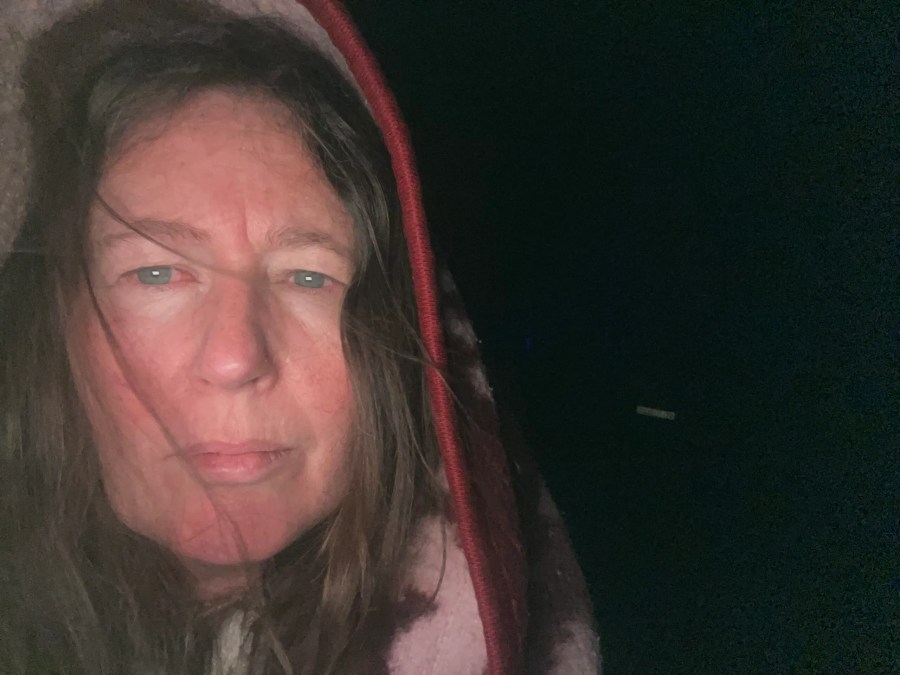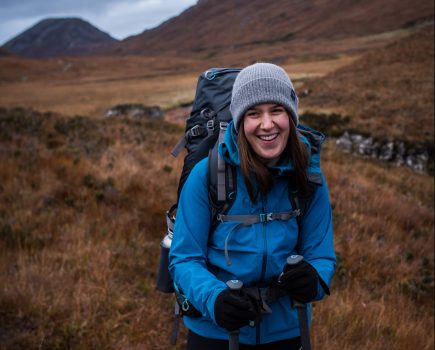Adventurer, author, and The Great Outdoors contributor Alice Morrison lives in the village of Imlil in the heart of the Atlas Mountains, around 50 miles from the epicentre of the recent Morocco earthquake.
Here she tells us her first-hand story of the earthquake and its aftermath, the selflessness and courage of Moroccans – and why now is the best time to plan a visit to this spectacular part of the world.
Main image: Alice in the early hours immediately following the earthquake | Photo: Alice Morrison
What are your thoughts and feelings right now?
I am exhausted and over-adrenalised. It is a week on from the earthquake and it has been such an emotional time. I have felt terror, gratitude, horror, grief, survivor’s guilt, comfort, friendship… I am so happy to be alive and that my village, Imlil, is safe but I mourn for the lost and the homeless and I am worried about what the future looks like.
Can you describe what the moment was like when the earthquake hit? Where were you, what did it feel and sound like, and what were your thoughts and emotions?
I was in bed sound asleep when I was jolted awake by this all-encompassing knocking sound. Immediately I understood it was an earthquake. My only thought was, ‘I have to get out’. I ran for the door and the walls were swaying towards me. I felt sick and terrified and totally panicked. I ran barefoot, and in my nightie, out into the yard. I have tall houses on one side built into the mountain and a drop on the other. I wanted to find the safest place I could away from both. I was totally alone in the darkness with the ground bucking under my feet. I thought I was going to die.
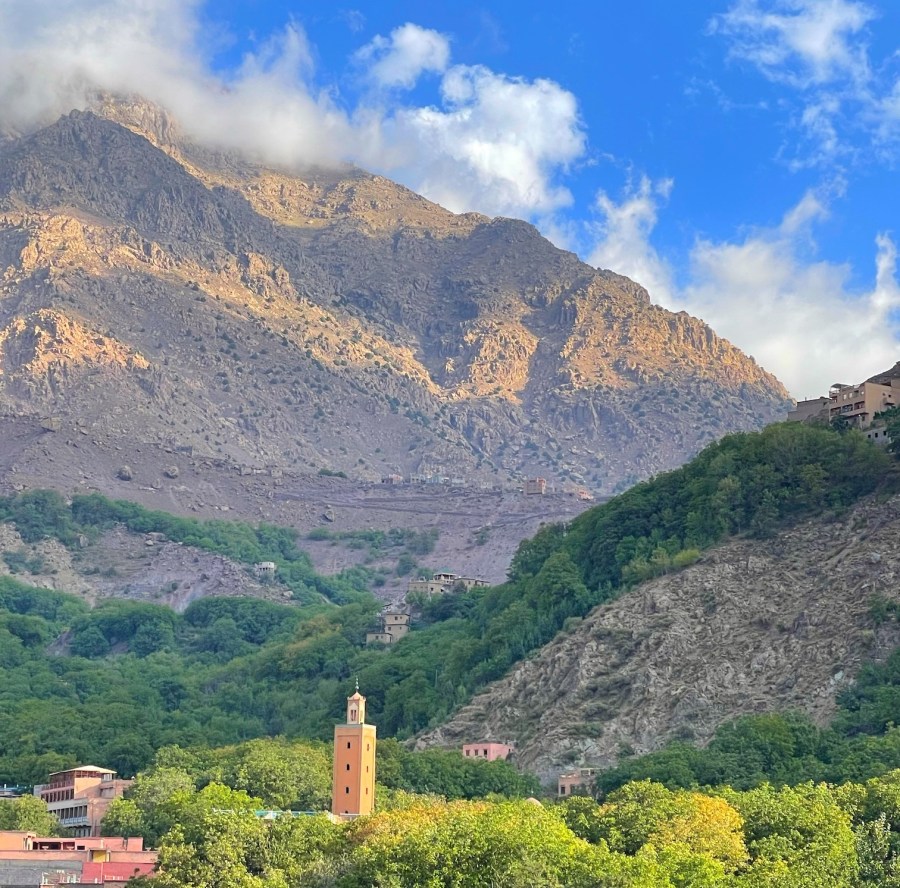
The view from Alice’s house over Imlil in the Atlas Mountains. Photo: Alice Morrison
How did you and the community around you respond as the earthquake happened, and in the moments immediately following it?
When the sound stopped and the tremor passed my neighbours started running out of their houses. We are about 20. Our youngest is two and our oldest is 100. One husband has had a stroke and can’t walk so had to be semi-carried. The women all had their babies strapped to their backs with shawls. We grabbed shawls and shoes from my house which was the closest and safest and then we walked together down the mule track to the road and car park. It is big and flat and our safest point.
Can you describe what happened over the course of the rest of the night? It must have been a frightening and difficult time.
It was freezing cold. We were all deeply shocked. The mobile signal died after half an hour. We women huddled together and the men did a lightning raid into the nearest houses for blankets and water. I stupidly hadn’t put on trousers or a jacket so I was absolutely freezing. I ended up sleeping part of the night in my car with three of the girls. I put a padded shopping bag – meant to keep things cool – on my head for warmth. It was almost impossible to sleep. We were just waiting for the light.
Did you have any sense of the wider extent of the earthquake at that time?
We had no sense at all of what was going on. The lower half of the village were all in the car park but we didn’t know if everyone was safe until later. People were desperate for news of family members.
What was the impact on Imlil and the area surrounding it? When did you first start getting a sense of the damage?
At dawn we started to go back to our homes to see what had happened.
Imlil has been so lucky. We didn’t have any deaths. Buildings have been damaged but it is lives that are the most important thing.
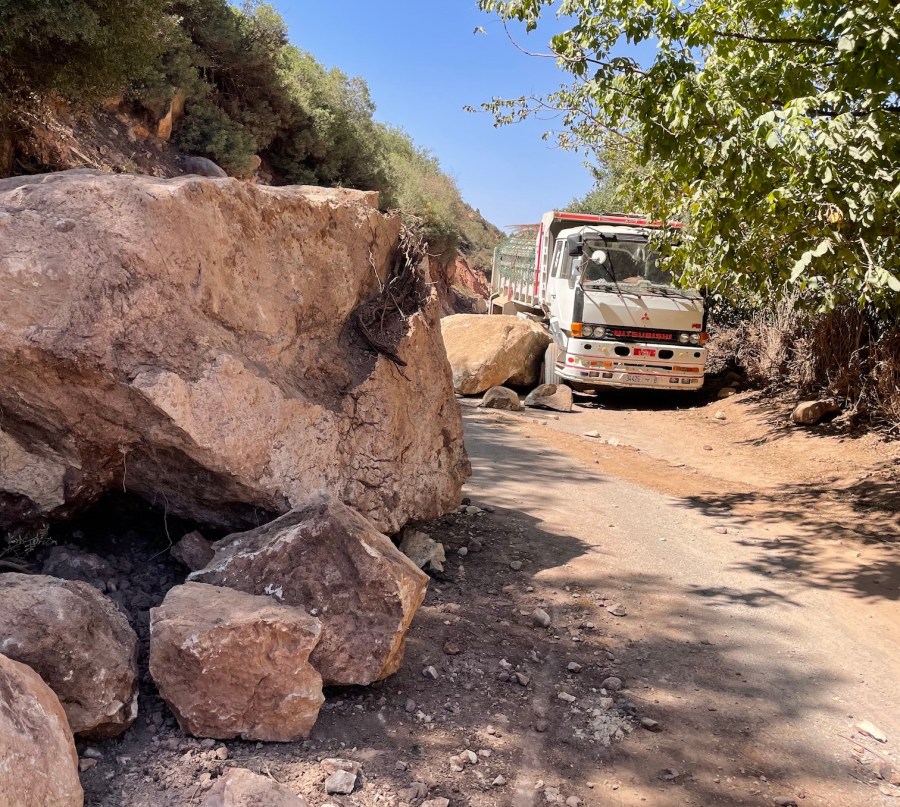
On the first day after the earthquake, roads were blocked the only way out of Imlil was by foot, bicycle or mule. Photo: Alice Morrison
What did you do during the following day?
At first, we were in a bubble. I went back home and fed my traumatised cats, got warm and slept for an hour. Then one of our family members arrived from Asni. He had set off at dawn to walk up and check we were alright and reassure us that they were ok. He told me Asni had signal but that the road was destroyed. I jumped on my mountain bike to go down. When I saw the road I realised that something truly dreadful had happened. It was apocalyptic: giant boulders, landslides, horrible skid marks where cars had been caught, vehicles trapped in rocks. I got signal and contacted all my family and then started doing BBC news interviews to try and get the word out. At 6pm I set off back up the mountain. I had to push a lot – and I swore a lot. I got back after dark. That night I stayed with the family in the tents the men had set up.
What were the scenes like when you visited the epicentre of the earthquake?
Truly horrible. When you see it on TV you are a bit removed but watching people dig through the rubble of their homes to salvage the odd pot and seeing the face of a woman who has lost her mother, son, father – eight members of her family – I don’t want to do that again. Those poor, poor people.
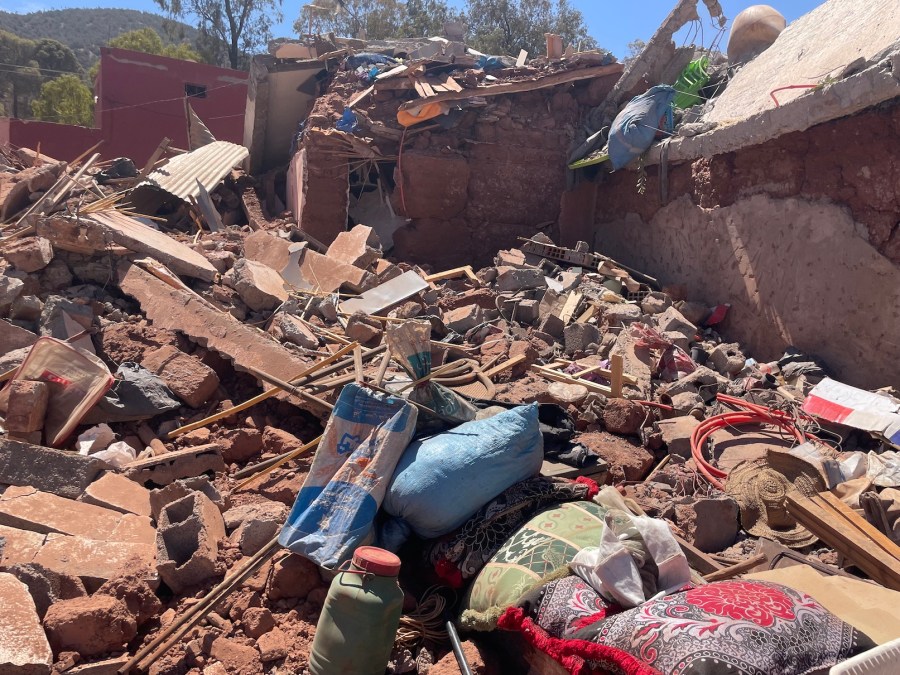
Destruction in Ouirgane. Photo: Alice Morrison
What have the days since been like? Has it been difficult to obtain food, water and supplies?
The Moroccan government and the citizens and the residents and the international community have all been brilliant. Everyone has pulled together. Roads were cleared by the army very quickly. Tented camps were set up along with a military hospital in Asni. We have been able to get everything we need. One of our shopkeepers, Hajj Omar, even opened to sell his tiny store of potatoes and onions.
How much more heavily impacted have the Atlas Mountains been because of geographical factors?
The geography has both helped and hindered. Unlike somewhere like Turkey, we don’t have any huge centres of population here. The loss of life has been devastating when you consider how scattered the population is. The geography definitely hampered the aid effort. There is one main road into the epicentre which had to be cleared and then of course there was an issue with more and more traffic coming in to help – think M25 on a Bank Holiday. For the tiny hamlets scattered a day or two days’ walk from any road, aid had to be helicoptered in and any rescue was done by the people themselves.
A difficult question, but how extensive has the loss of life been in the area around you? How evident has this been?
In the Imlil valley on the road to Asni, I have been told of 10 people being lost in one hamlet and four in another and so on. You can see where the clay houses have collapsed. Imlil, Armd, Tamatert were all safe. When you get to Asni, there were more casualties and then in Moulay Brahim above, many more. But the hardest hit was Ouirgane, Ijoukak, Talaat N’Yaaqoub and that whole line down the road. There, it was absolutely horrific. Whole families gone. Whole villages gone. Latest estimates put the death toll at over 3,000.
How have the people and communities of the Atlas Mountains responded to the earthquake?
With nobility and courage. Everyone has rushed to help everyone else. No-one thinks of themselves only those who are worse off. I saw men on the morning after the quake, walking groups of tourists down to safety – leaving their own families to help foreigners.
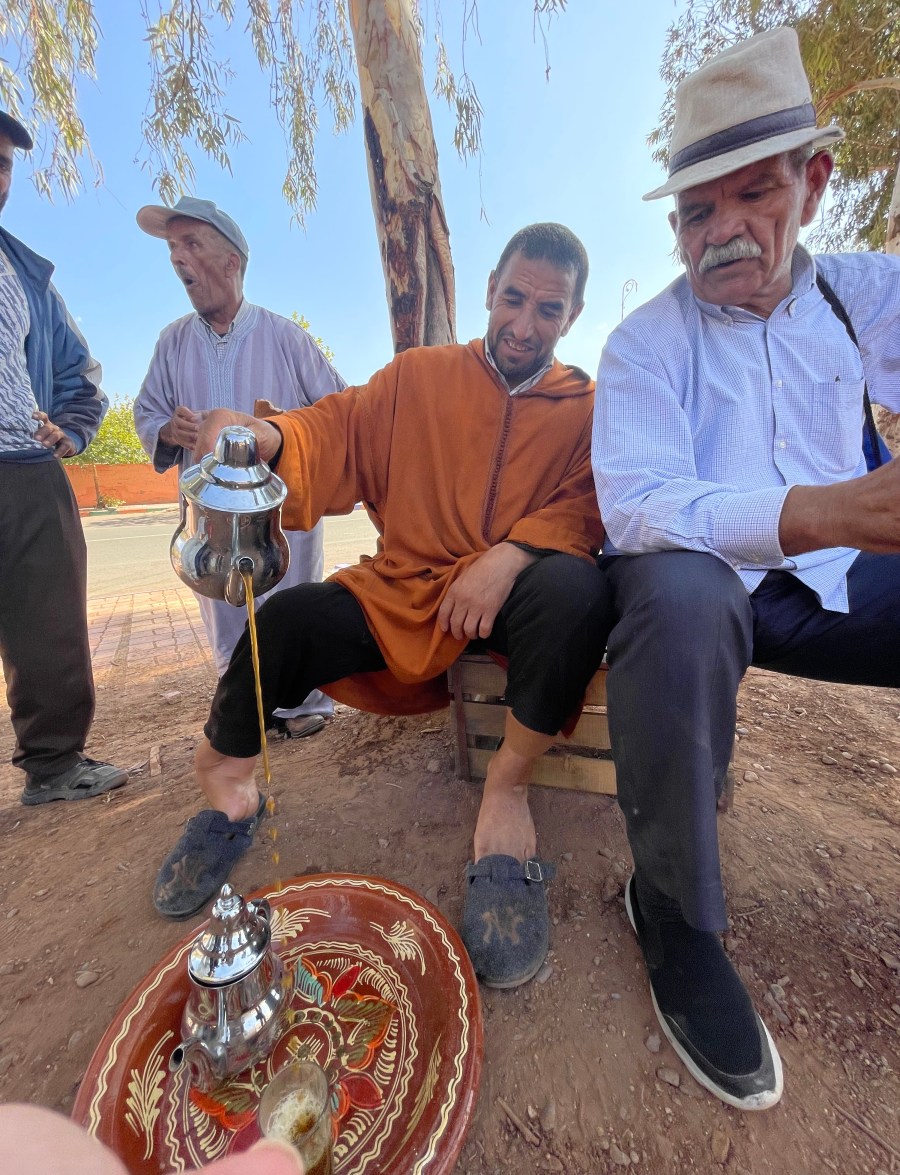
Moroccan spirit: life carries on. Photo: Alice Morrison
What do you think are the best ways for people in the UK and outside Morocco to help?
You can donate money – now we are looking to rebuild. The British Moroccan Society has great and longstanding connections to Atlas communities and you can donate via the GoFundMe page they have set up.
Even better, book a trip. Come and hike here, or mountain bike. Imlil is open for business. The Toubkal refuges are intact. The guides here will put your safety, comfort and enjoyment above everything else. The mountain guides, hotel owners, restaurants and shops all need tourism to exist, so please come and enjoy these amazing mountains and meet these wonderful people for yourself. (Alice shared the best walking in the Atlas Mountains in the January 2023 issue of The Great Outdoors.)
Just to give people a sense of your own story, how long have you lived in the Atlas Mountains and why did it appeal to you?
I have lived here for five years. I came to train for the Everest Trail Ultra because I needed mountains and the altitude. The Amazigh (Berber) people have captured my heart. The community here is so warm and the people are funny and welcoming and their values are all around family and living at one with the environment. It is about simplicity and sharing not greed and individual ambition. Also, the view from my terrace is spectacular – I will never find anywhere else as beautiful.
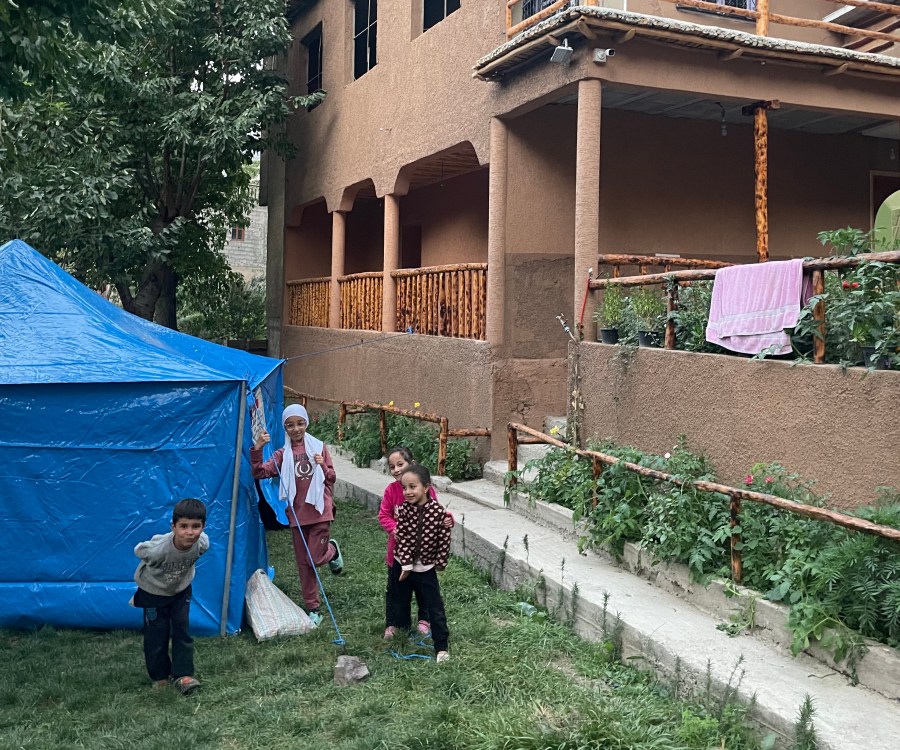
Alice says Imlil after the earthquake is still in good shape and welcoming visitors. Photo: Alice Morrison
Why is hiking in the Atlas Mountains special?
The landscape is spectacular. The mountains are high and rugged and the valleys are full of cherry tree blossom in the spring and the shade of walnut trees in the summer. Hiking here is exciting and there is a lot to learn. For most visitors though (like me) it is the welcome that they will receive and the connections they will make with the local people that will keep them coming back.

